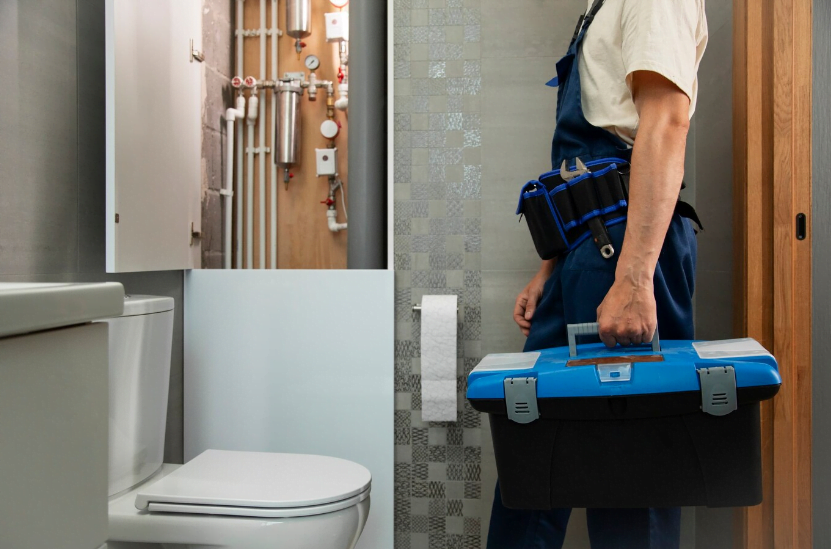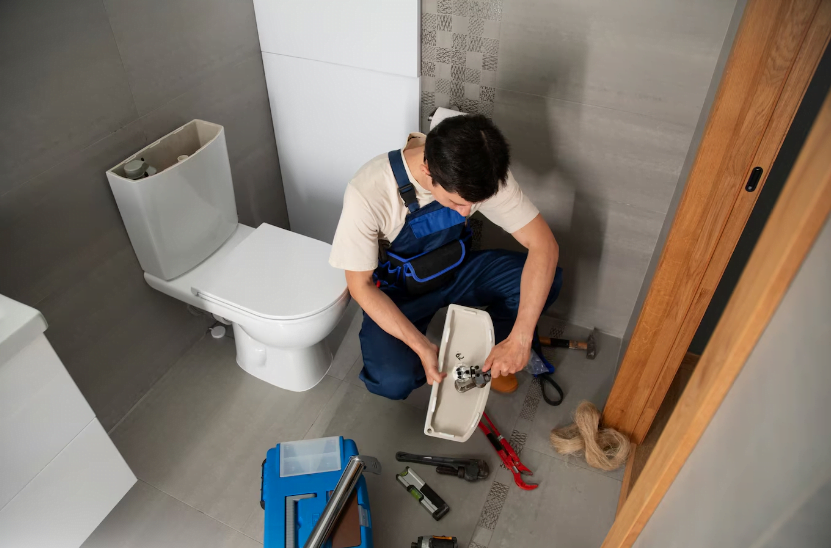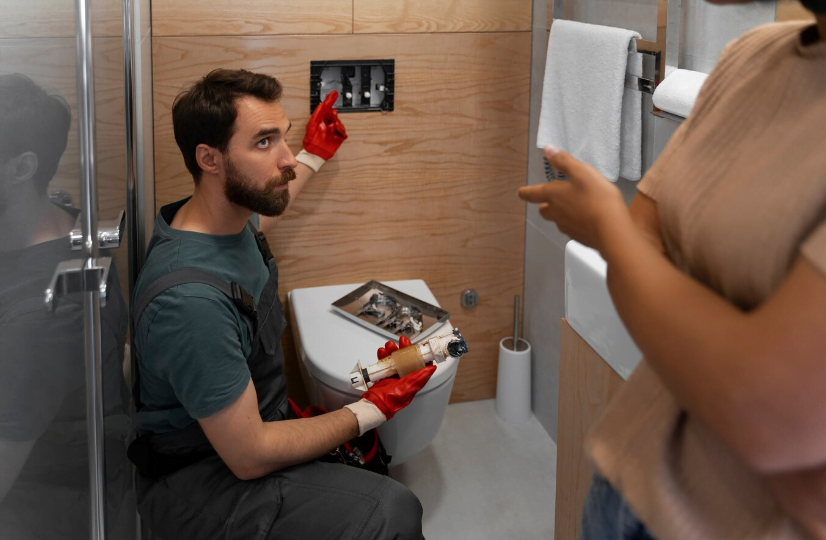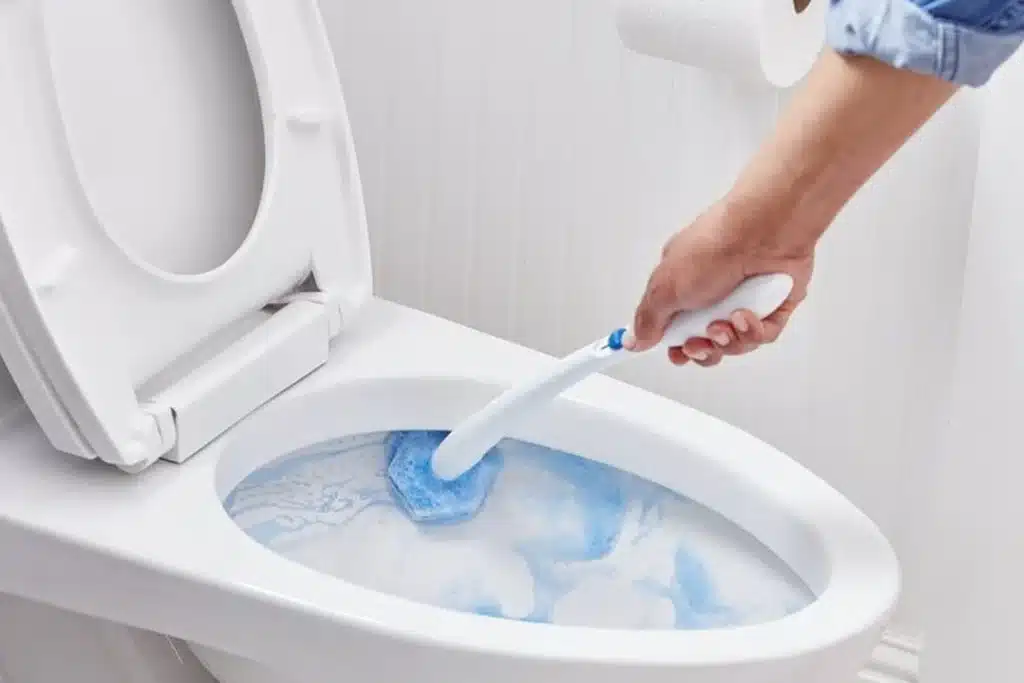Yes, Can You Use Septic Cleaner in a Regular Toilet? It is designed to be safe for all plumbing systems.
Ensuring your home’s plumbing remains in tip-top shape is essential for maintaining a clean and odor-free living environment. Septic cleaners are formulated to break down waste, prevent clogging, and reduce odors, making them an effective solution for regular toilet maintenance.
They contain beneficial bacteria and enzymes that work to degrade organic matter within septic systems and can also serve to clean and maintain pipes in homes connected to municipal sewer lines. Regular use of a septic cleaner as part of your household maintenance routine helps keep both septic systems and standard toilets running smoothly, preventing the build-up of waste and potential plumbing issues.

Introduction To Septic Cleaners And Regular Toilets
When dealing with household plumbing, understanding what goes into your toilets is crucial. Using the right products can prevent issues. In this guide, we explore if septic cleaners are safe for regular toilets.
Understanding Septic Systems
Septic systems are underground wastewater treatment structures. They use natural processes to treat sewage from homes not attached to a municipal sewer system. Septic systems are common in rural areas. They have a septic tank and drain field. It is important to maintain these systems with the correct cleaners.
Distinguishing Between Septic And Sewer Systems
A septic system is a self-contained wastewater treatment setup. A sewer system, on the other hand, connects to a city’s infrastructure. Knowing which system your home uses is vital. This will guide you in selecting the appropriate toilet cleaners.
- Septic System: Individual treatment, needs special cleaners.
- Sewer System: City-managed, less restrictive on cleaners.
Components And Chemicals In Septic Cleaners
Understanding what goes into septic cleaners is crucial for responsible maintenance. These products consist of various components and chemicals. They are designed to break down waste and keep septic systems functioning smoothly. It’s important to consider these ingredients. There’s a need to assess their suitability for use in regular toilets.
Common Ingredients In Septic Cleaners
Septic cleaners usually contain:
- Biological additives, like bacteria and enzymes, which digest organic waste.
- Chemical additives to dissolve grease and scum.
- pH modifiers to balance the acidity in the tank.
| Type of Ingredient | Function |
|---|---|
| Biological Additives | Digest organic waste. |
| Chemical Additives | Dissolve grease and scum. |
| pH Modifiers | Balance tank acidity. |
Potential Impact Of Chemicals On Plumbing
When used in regular toilets, septic cleaners’ chemicals can have different effects on plumbing systems. Strong chemicals might damage the pipes and seals.
The impact includes:
- Eroding pipe joints and materials.
- Damaging seals and gaskets.
- Disrupting the balance of beneficial bacteria in sewage networks.
How Septic Cleaners Work
Understanding the power of septic cleaners starts with science. These cleaners pack a punch. They keep your septic system healthy. Your regular toilet can benefit, too.
The Science Behind Septic Cleaners
Bacteria and enzymes make septic cleaners work. They break down waste in your septic tank. This means less sludge and odor.
- Bacteria eat away solids in the tank.
- Enzymes speed up the breakdown process.
Together, they maintain a free-flowing system. Septic cleaners contain natural, non-toxic ingredients. Safe for pipes and tanks, they are also eco-friendly.
Benefits Of Using Septic Cleaners In Septic Systems
Septic cleaners offer several benefits:
| Benefit | Description |
|---|---|
| Prevents Blockages | Enzymes help prevent clogs. A clear path means no backups. |
| Controls Odor | Bad smells diminish. Bacteria target and neutralize odor sources. |
| Extends Tank Life | Regular use reduces wear. This can result in fewer repairs. |
| Environmentally Safe | These cleaners are biodegradable. They don’t harm the environment. |
Regular toilets lead to the same septic system. Using septic cleaners keeps the overall system working smoothly. A healthy septic system means a happy home.
Regular Toilets Connected To Municipal Sewage
Regular toilets connected to municipal sewage systems are quite common in urban areas. Unlike septic systems, these are part of a larger infrastructure. They are maintained by local governments.
Overview Of Municipal Sewage Systems
Municipal sewage systems transport waste from homes to treatment facilities. Strong, durable pipes handle millions of gallons daily. The waste gets treated and released into the environment safely.
Comparative Analysis: Septic Vs. Sewer Waste Management
| Feature | Septic System | Sewer System |
|---|---|---|
| Maintenance | Homeowner’s responsibility | City-managed |
| Costs | Variable, depending on maintenance | Monthly fee |
| Capacity | Limited to tank size | Large, serves multiple homes |
| Waste Processing | Natural breakdown in tank | Processed at treatment plant |
Regular toilets can flush septic cleaners into sewer systems. These cleaners might not be necessary in municipal systems. They already have robust waste processing. Septic cleaners could disrupt the natural treatments in place at sewage facilities. Experts design these for septic tanks.
Potential Risks Of Using Septic Cleaner In Regular Toilets
Septic cleaners are tailor-made for septic tank systems, not regular toilets. Regular toilets connect to city sewer lines. Using septic tank additives in them might not be safe. This could lead to complications. These complications could affect both sewage systems and your home plumbing.
Chemical Reactions With Municipal Sewage Treatment
City sewage systems have their own cleaning processes. Septic cleaners can disrupt these processes. They sometimes contain chemicals that react poorly with sewage treatment protocols. This could harm the overall waste management system. Here’s what could happen:
- Interference with the biological balance of municipal treatment facilities.
- Unexpected chemical reactions causing damage to the infrastructure.
- Release of harmful byproducts into the environment.
Long-term Effects On Sewer Lines
Long-term consequences should not be overlooked. Septic cleaners might gradually harm the pipes leading to the sewer. Cast iron and PVC pipes could be at risk:
| Type of Pipe | Potential Risk |
|---|---|
| Cast Iron | Corrosion over time leading to leaks |
| PVC | Chemical reaction leading to brittleness and breakage |
Consistent use of septic cleaners might lead to expensive repairs. It could also cause severe blockages in the sewer system. Both homeowners and city services would be affected. Being aware of these risks is crucial for maintaining your home’s plumbing health and the environment.
Expert Opinions On Septic Cleaners In Urban Settings
An intriguing question circulates among urban homeowners: Is it wise to use septic cleaner in a regular toilet? The bustling city life rarely accommodates septic tanks. Hence, the use of septic cleaners becomes a topic of interest. Esteemed professionals weigh in on the matter.
Plumbers’ Perspectives
City plumbers encounter a myriad of pipe systems. They stress that regular toilets connect to sewer lines, not septic systems. Septic cleaners contain bacteria and enzymes. They break down waste in septic tanks. Urban plumbing may not require these formulations. Professionals remain wary. Traditional chemical cleaners could harm your plumbing over time. They recommend reading the label. If it says ‘safe for all pipes,’ it’s likely a green light.
Environmental Scientists’ Insights
Environmental scientists focus on the product’s impact. They consider soil health and water quality. Septic cleaners often boast natural ingredients. This is beneficial to the environment. Yet, a city’s wastewater treatment plant already decomposes waste effectively. Adding septic cleaner might be redundant. Moreover, scientists urge residents to check their local regulations. Some components in septic cleaners might be restricted. They advocate for mindfulness with the ecosystem in mind.
Alternatives To Septic Cleaners For Regular Toilets
Many wonder if they can use septic cleaners in regular toilets. It’s essential to explore safe alternatives that won’t harm plumbing systems. Septic cleaners are specific to septic tank maintenance, but regular toilets often require gentler solutions.
Eco-friendly Products
Options abound for eco-conscious homeowners. Eco-friendly products include enzyme-based cleaners. These cleaners break down organic waste without harsh chemicals.
- Baking soda and vinegar create a fizzing action that helps to clean and deodorize.
- Citrus cleaners harness the natural acids in lemons or oranges for a fresh scent and clean bowl.
- Eco-friendly brands offer toilet cleaners that are biodegradable and safe for all types of plumbing.
Homemade Cleaning Solutions
DIY solutions can be just as effective – and often more cost-effective. Consider these homemade mixes:
| Ingredients | Cleaning Use |
|---|---|
| 1/2 cup baking soda | Cleans and deodorizes |
| 1/4 cup hydrogen peroxide | Whitens and sanitizes |
| 1 cup white vinegar | Removes water stains |
Blend these ingredients for a powerful toilet cleaner that keeps your toilet fresh.
- Pour all ingredients into the toilet bowl.
- Scrub with a toilet brush.
- Leave for 15 minutes.
- Flush to rinse away grime.

Proper Maintenance Of Toilets In Sewer Systems
Keeping the toilets connected to sewer systems in top condition matters. Regular care prevents costly repairs. This includes the right cleaners and avoiding blockages. Let’s explore how to maintain these systems effectively.
Routine Cleaning And Care
Regular cleaning keeps toilets sparkling and functional. Use gentle, sewer-safe cleaners. Here’s a simple guide:
- Opt for non-abrasive toilet bowl cleaners.
- Use a toilet brush for scrubbing weekly.
- Flush only human waste and toilet paper.
- Check for leaks in the tank and base frequently.
Bleaches and chemical cleaners may harm the sewer system. Enzyme-based products are often recommended. Flush these monthly to break down waste.
Avoiding Common Blockages
Blockages disrupt the flow in toilets. Here’s what should never go down:
| Do Not Flush | Reason |
|---|---|
| Wipes (even ‘flushable’ ones) | They don’t break down like toilet paper. |
| Grease or oils | They solidify and cause clogs. |
| Medication | It contaminates waterways. |
| Cotton products | They expand and cause blockages. |
To protect against blockages, do regular checks. If slow drainage occurs, investigate it right away.
Legal And Regulatory Considerations
When considering the use of septic cleaner in a regular toilet, understanding legal and regulatory considerations is crucial. Specific laws govern what substances you can safely discharge into municipal sewage systems. Before proceeding with any septic treatment product, familiarize yourself with these rules to ensure compliance and avoid potential penalties.
Chemical Restrictions And Sewage Regulations
Local authorities set certain chemical restrictions to protect the sewage system. The Environmental Protection Agency (EPA) often dictates these regulations to ensure public safety and environmental health.
- Check the active ingredients of septic cleaners.
- Banned substances must be avoided at all costs.
- Regulations may differ from city to city.
Always consult the sewer department’s guidelines or conduct research online for regional limitations.
Implications For Violating Local Guidelines
Using unauthorized septic cleaners may lead to serious consequences. If such products damage the sewage system or harm the environment, penalties are possible:
- Fines and fees for non-compliance.
- Legal action from local authorities.
- Costly repairs for damage caused.
To avoid these risks, always choose approved septic cleaners for regular toilets.
Stay informed and act responsibly to avoid breaking local sewage laws.
User Testimonials And Experiences
Many have asked, “can you use septic cleaner in a regular toilet?” People’s experiences reveal the truth behind this common query. Dig into real-life stories to uncover how septic cleaners perform in everyday toilets.
Success Stories With Septic Cleaners
- John’s Sparkling Bowl: “I used septic cleaner in my toilet, and now it’s free from clogs.”
- Emily’s Fresh Experience: “Septic cleaner even got rid of that bad smell. My toilet’s like new.”
- Mike’s Quick Fix: “Just a dose of septic cleaner cleared up my slow flush. It was amazing.”
These stories warm the heart. People find septic cleaners a toilet miracle.
Damage Reports And Warnings
But not all tales are victories. Some tell of woes. Here’s what you should know:
| User | Damage Reported |
|---|---|
| Susan’s Regret: | Her pipes corroded after use, leading to costly repairs. |
| Bob’s Oops: | Bob saw his toilet’s rubber parts deteriorate over time. |
| Lisa’s Warning: | Lisa cautions, “Check with a pro before trying it yourself.” |
Not everyone is cheering. These warnings are real, and they matter. Choose wisely and seek professional advice if in doubt.
Conclusion: Best Practices For Toilet Maintenance
Maintaining your toilet properly ensures its longevity and prevents plumbing issues. Regular cleaning with the right products keeps your system healthy. Certain cleaners designed for septic systems can work in regular toilets, yet it’s crucial to choose the correct type. Let’s recap our toilet care guidelines.
Summary Of Do’s And Don’ts
Keep your toilet in top shape with these simple tips:
- Do: Use cleaners labeled safe for all toilet systems.
- Do: Follow the cleaner’s instructions carefully.
- Do: Opt for natural, non-corrosive products where possible.
- Don’t: Flush non-degradable items like wipes or floss.
- Don’t: Overuse chemical cleaners that can harm pipes.
- Don’t: Ignore regular maintenance schedules.
Future Outlook On Septic Care And Municipal Sewage
Advancements in septic care and sewage management are ongoing:
- Eco-friendly products are rising in popularity, reducing environmental impact.
- Biodegradable cleaners are gaining traction for their effectiveness and sustainability.
- Innovative technologies are developing to improve municipal sewage systems.
- Public awareness campaigns are increasing knowledge on proper toilet maintenance.
Staying informed and adopting best practices will contribute to the overall health of your home’s plumbing and the environment.

Frequently Asked Questions For Can You Use Septic Cleaner In A Regular Toilet
Can Septic Cleaner Damage Regular Toilet Components?
Septic cleaners are generally safe for regular toilets. They are designed to break down waste without harming plumbing. However, always check the cleaner’s label for compatibility with your toilet system before use.
How Often Should You Use Septic Cleaner In A Toilet?
For maintenance, using septic cleaner once every 1-3 months is recommended. This schedule helps maintain a balance in your septic system. It’s important to follow the product’s instructions for the best results.
What Are The Benefits Of Using Septic Cleaner In Toilets?
Septic cleaners promote a healthy bacterial balance in septic tanks, reducing the likelihood of blockages. They also help decompose waste effectively, minimizing odors and potential backups in your plumbing system.
Is It Safe To Use Septic Cleaner With Toilet Bowl Cleaners?
Generally, it’s safe to use septic cleaners with toilet bowl cleaners. Be cautious, though, as mixing different chemical cleaners can sometimes cause harmful reactions. To avoid interactions, use them separately and flush thoroughly between applications.
Conclusion
To sum up, using a septic cleaner in a regular toilet is generally safe and can be effective for maintenance. Remember, choose a product suited for both systems to ensure optimal results. Regular cleaning keeps your plumbing hassle-free and extends its lifespan.
Prioritize eco-friendly options for a greener home.

